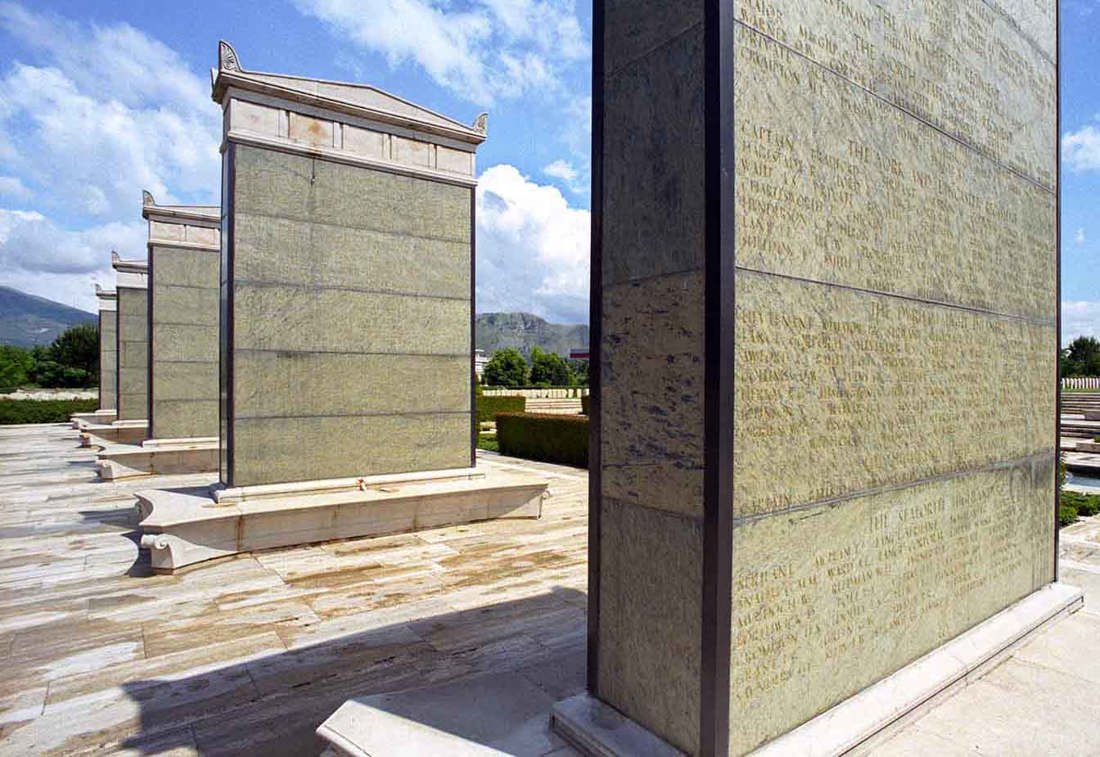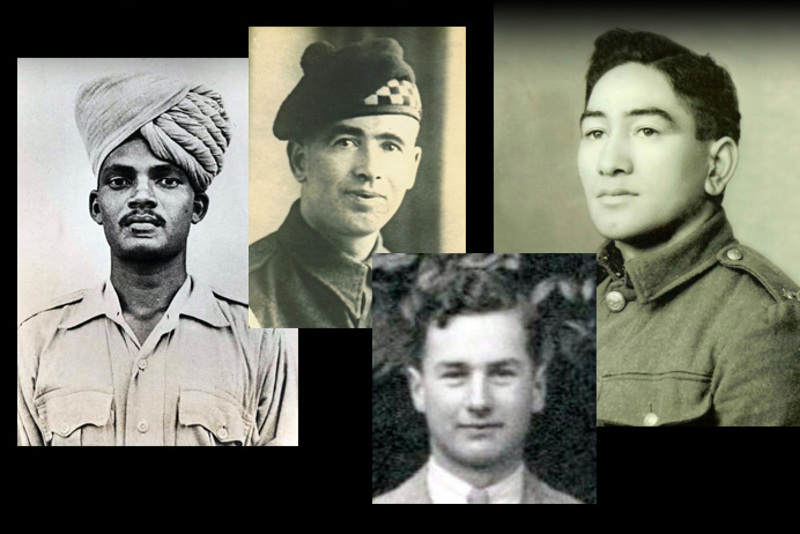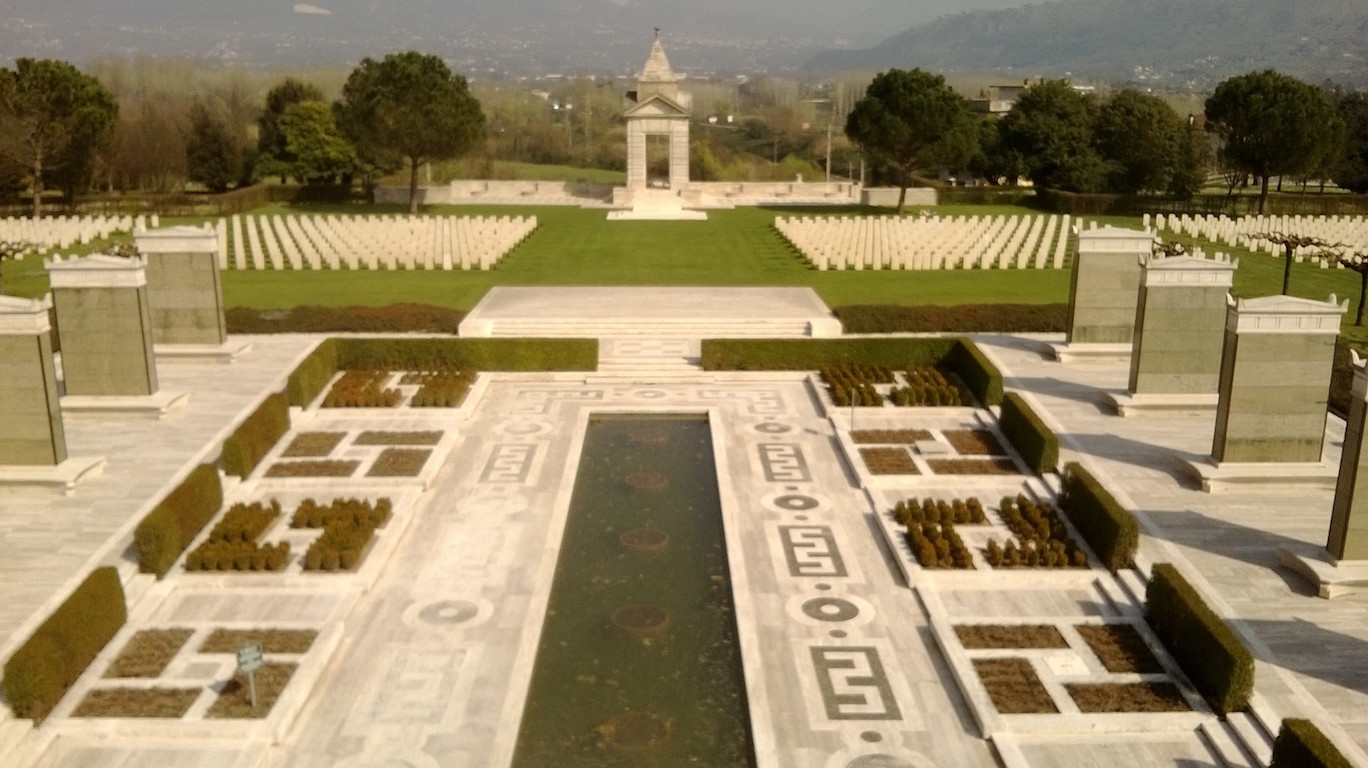Cassino Memorial
- Country Italy
- Total identified casualties 4034 Find these casualties
- Identified casualties from Second World War
- GPS Coordinates Latitude: 41.47763, Longitude: 13.82609


Go on a virtual visit to Cassino War Cemetery
Cassino War Cemetery and Memorial have For Evermore tours available using the FREE app for mobile phones and tablets. The tours cover different aspects of the site and the Commonwealth servicemen and women we commemorate within the grounds.
The app can be used remotely or, If you are visiting the cemetery, you can use the tour to follow a path around it, reading the stories along the route. There is also a scan function allowing the user to scan a headstone and bring up the related casualty information throughout the cemetery.
The For Evermore app can be downloaded from the links below.

Access the Cassino virtual tour via the For Evermore app, available on IOS and Android.
Download FREE app for iOS Download FREE app for Android

SHARE THE STORIES OF CASSINO AND THE ITALIAN CAMPAIGN
If you'd like to know more about who we commemorate, visit For Evermore: Stories of the Fallen, the CWGC online commemorative resource. Here you can read and share the fascinating stories from some of the people who took part in the Italian Campaign.
Location information
Cassino Memorial is located in Cassino War Cemetery, which lies in the Commune of Cassino, Province of Frosinone, 139 kilometres south-east of Rome.
Take the autostrada A1 from Rome to Naples and leave it at the Cassino exit. Take the roundabaout and take the third exit and follow the road signs to Cassino. On this road you will find the first of 6 clearly visible signposts to the cemetery and memorial.
The cemetery is located approximately 1 kilometre from the railway station in Via Sant Angelo and visitors arriving by train are advised to take a taxi from the station.
Visiting information
PARKING
There is a large car park at the cemetery; the ground is flat and level.
It is also possible to park along the edge of the main road leading to the cemetery.
There are two large metal gates from the car park into the cemetery. The gates are approximately 180 cm wide and locked outside of working hours.
MAIN ENTRANCE, ACCESS, AND LAYOUT
There is a small step from the car park up to the main gates. Once at the gates the surface is smooth and flat. There are approximately 20 steps leading up to the main entrance platform building on either side of the gates.
Steps lead up to the main entrance building, which contains a central round table. The floor is comprised of small, rounded cobble mosaic, which are not flush.
The main entrance platform opens directly into the cemetery. The Stone of Remembrance is in front of the entrance building.
Once inside the cemetery, paths are grass and slightly sloped in places.
The Register Boxes are in the shelter building on the south side of the cemetery. The building has two large gates; each approximately 700 mm wide.
The Cassino Memorial is located on either side of an ornamental garden; tall pillars and a water feature. There are stone steps going down to the pillars.
The Cross of Sacrifice is on the far side of the central water feature, towards the rear of cemetery.
There are two shelter buildings with internal stone benches at either side of the cemetery, both with two large double gates.
There are seating areas with stone benches scattered around the cemetery, as well as multiple stone benches built into the entrance structure.
ALTERNATIVE ENTRANCE
The alternative access to the cemetery is through the service entrance. There is a barrier at the service entrance approximately three metres wide, the barrier is locked at weekends.
ADDITIONAL INFORMATION
Opening hours for Cassino War Cemetery are as follows:
0800 hrs to 1200 hrs then 1300 hrs to 1530 hrs – During Winter Months.
0730 hrs to 1200 hrs then 1300 hrs to 1600 hrs – During Summer Months.
Due to thefts, the cemetery Register, and Visitors book are only available during gardener’s working hours.
Visitors to the cemetery should not leave valuables in unattended vehicles. Visitors should ensure that their vehicles are locked.
History information
On 3 September 1943 the Allies invaded the Italian mainland, the invasion coinciding with an armistice made with the Italians who then re-entered the war on the Allied side.
Progress through southern Italy was rapid despite stiff resistance, but by the end of October, the Allies were facing the German winter defensive position known as the Gustav Line, which stretched from the river Garigliano in the west to the Sangro in the east. Initial attempts to breach the western end of the line were unsuccessful. Operations in January 1944 landed troops behind the German lines at Anzio, but defences were well organised, and a breakthrough was not actually achieved until 18 May, when Cassino was finally taken.
The site for CASSINO WAR CEMETERY was originally selected in January 1944, but the development of the battle during the first five months of that year made it impossible to use it until after the Germans had withdrawn from Cassino. During these early months of 1944, Cassino saw some of the fiercest fighting of the Italian campaign, the town itself and the dominating Monastery Hill proving the most stubborn obstacles encountered in the advance towards Rome. The majority of those buried in the war cemetery died in the battles during these months.
There are now 4,266 Commonwealth servicemen of the Second World War buried or commemorated at Cassino War Cemetery. 284 of the burials are unidentified.
Within the cemetery stands the CASSINO MEMORIAL which commemorates over 3,100 Commonwealth servicemen who took part in the Italian campaign and whose graves are not known. In addition, over 900 Indian soldiers are commemorated on this memorial whose remains were cremated. The Memorial was designed by Louis de Soissons and unveiled by Field Marshal The Rt. Hon. The Earl Alexander of Tunis on 30 September 1956.


